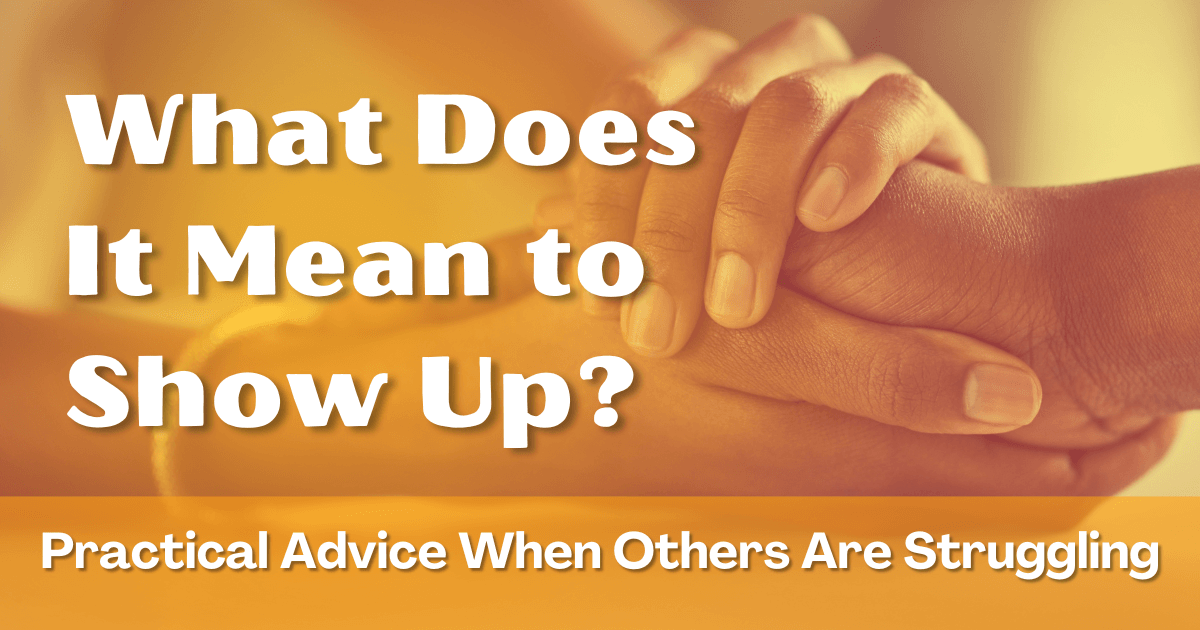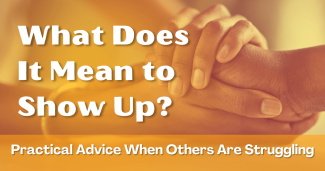What Does It Mean to Show Up? Practical Advice When Others Are Struggling

[Editor’s Note: Here on our blog, MCN’s Director of Witness to Witness, Kaethe Weingarten, PhD, shares stories, resources, and helpful tips to support health care workers through the many stressors of their daily lives. In this article, Dr. Weingarten outlines practical ways to support others as they go through difficult times. Dr. Weingarten also offers a newsletter (called the W2W Update), filled with resources, recent articles, and her news and views.]
I have spent a good deal of my writing life exploring facets of the domain of sorrow. I have also often illustrated the experience of sorrow with material from my own life, for, as my doctors frequently tell me, I have had “more than my share” of medical misfortune. A concept that I developed to support me after a scary medical diagnosis of a family member was that of reasonable hope. Re-reading about it now, I notice that despite the primary directive in the short and long papers that I wrote about reasonable hope -- that “reasonable hope is something we do, preferably with others” – I mostly focus on what an individual in distress can do. Granted, that is important. I have written specifically about practices I have done when faced with a looming personal “catastrophe.” In my case, I was told I might be going blind. (I was not.) So, I definitely believe having a toolbox of practices that help us function is vital when one is scared, demoralized, emotionally exhausted, or even paralyzed. There are also many books that are meant to guide people who are suffering. I often recommend Jon Kabat -Zinn’s Full Catastrophe Living: Using the Wisdom of Your Body and Mind to Face Stress, Pain, and Illness if for no other reason than the title, which, just saying out loud helps me.
I have given less of my writing life to describing practices that others can do when they learn a loved one, colleague, or friend is having a hard time. One of the webinars we provided for MCN early in the pandemic was on just that subject -- How to Support a Friend, Family Member or Colleague Who Is Suffering in the Context of the Pandemic. Over 300 people attended and we had hundreds of comments in the chat, since the format was interactive. The appetite for learning what helps and what harms was palpable even over Zoom.
I recently read a guest essay in the New York Times that impressed me by a Rabbi whose work I read periodically. Rabbi Sharon Brous, the founding and senior rabbi of Ikar, a Jewish community in Los Angeles, was taken with a ritual practice that she read about in the Mishnah, an ancient Jewish legal text dating from the third century. In this practice, several times a year, Jews would converge on the Temple Mount plaza in Jerusalem and walk in one of two directions. If they were arriving there “brokenhearted,” in need of comfort, they would walk in one direction and if they were not feeling vulnerable, they would walk in the opposite direction. What struck her particularly, as it does me, was that the two lines of marchers would encounter each other, one in pain, one not in pain at that moment. “And each person who encountered someone in pain would look into that person’s eyes and inquire: ‘What happened to you? Why does your heart ache?’” These two questions are wonderful and important but there is an equally important implicit message in the questioner/comforter just being there: I am showing up for others. I am offering presence.
Most of us know that offering our presence when someone is distressed is good to do. And many of us also feel awkward about knowing what might be comforting. I have recently experienced a challenging situation and received comfort from a wide range of gestures.
“I’m here for you to disgorge it all on me, whenever you want,” a colleague wrote. A friend sent several texts with photos of her friend’s paintings. I didn’t know the friend, but I enjoyed the art work. Another friend left a quart glass bottle of soup on my doorstep with a note that read in part, “I’m sorry that times are tough for you. I always hope that soup will help a little and this is good purple potato soup.” It was delicious! Another friend sent a book, the sub-title of which was “Fifty Entries Against Despair.” The title alone communicated that my friend had been a good listener. I’ve also gotten “thinking of you” texts with heart-shaped emojis. And a colleague sent a care package with chocolate, funny words, and warm socks.
None of these solved the problem or resolved my dilemma and I’m ever so grateful no one attempted to do that. What each gesture communicated was kindness, caring, and that I had been heard. It wouldn’t have mattered if the soup had been inedible and the socks ugly. What mattered was exactly what Rabbi Brous named: showing up.
Lots of factors interfere with showing up. We are insecure about what to say or do so we do nothing. Or, we are resentful that no one showed up for us, so we withdraw out of petulance. Or, we have the mistaken belief that nothing small we might offer would be adequate to the situation so best not to even try. There is no end of reasons people use to justify doing nothing when the one thing that matters is doing something. The beloved Vietnamese Buddhist monk Thích Nhất Hạnh undermines this human tendency with a simple sentence that helps people give others their caring attention: “Dear one, I am here for you.” How wonderful when this sentence is followed by attentive listening.
Life is messy and life deals. No one escapes suffering. During another medically challenging time in my life in 2015, I received an unusual greeting card that made me laugh out loud. It said, “I Promise Never to Refer to your Illness as a ‘Journey’ Unless Someone Takes You on a Cruise.” I have saved that card for all these years! And I remember looking up the designer and reading another saying on a card that brought a smile of recognition: “When the going gets tough, the tough cry in the car.” The author/illustrator, Emily McDowell, now has a website with lots of card collections, all of which have pithy sayings that punch holes in conventional, unhelpful bromides. She has also co-authored a book with Kelsey Crowe, Ph.D. that provides a step-by-step guide to showing up. The book is honest, hilarious, and helpful. It may not date from the third century, but it is definitely wise. Oh, and by the way, the book title is: “There is no good card for this: What to say and do when life is scary, awful and unfair to people you love.”
- Log in to post comments






